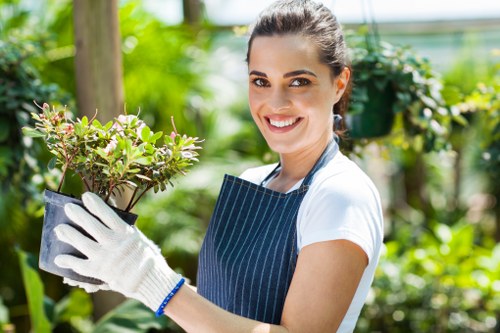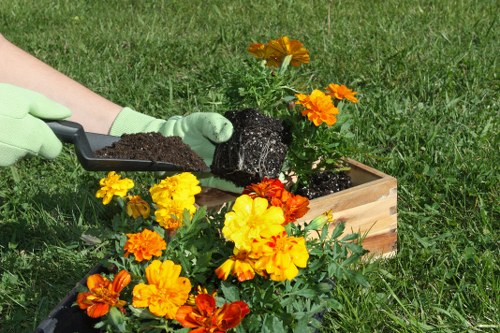Enhancing Outdoor Spaces: Landscaping in Sudbury
Introduction to Landscaping in Sudbury

Sudbury, known for its rich natural landscapes and vibrant community, offers a unique environment for both residential and commercial landscaping projects. Whether you're looking to redesign your backyard, create a welcoming entrance for your business, or maintain a thriving garden, understanding the local climate and soil conditions is crucial for successful landscaping.
Landscaping in Sudbury goes beyond mere aesthetics; it's about creating functional outdoor spaces that enhance your property's value and provide a sanctuary for relaxation and recreation. From selecting the right plants to implementing sustainable practices, there's a myriad of factors to consider when embarking on a landscaping project in this region.
In this comprehensive guide, we'll explore the various aspects of landscaping in Sudbury, including popular design trends, essential tips for plant selection, maintenance strategies, and the benefits of hiring professional landscapers. Whether you're a seasoned gardening enthusiast or a homeowner just starting, this article will provide valuable insights to help you achieve your landscaping goals.
Understanding Sudbury's Climate and Soil

Sudbury experiences a humid continental climate, characterized by warm summers and cold, snowy winters. This climate significantly influences the types of plants that thrive in the region, making it essential to choose species that can withstand temperature fluctuations and seasonal changes.
The soil in Sudbury varies from sandy loam to clay, providing a diverse foundation for different landscaping projects. Conducting a soil test can help determine the pH level and nutrient content, guiding you in selecting appropriate plants and amendments to ensure healthy growth.
Additionally, understanding the drainage patterns is vital. Proper drainage prevents waterlogging and root rot, ensuring that your plants remain healthy throughout the year. Incorporating elements like raised beds or permeable paving can help manage water flow effectively.
Popular Landscaping Designs in Sudbury

Modern landscaping in Sudbury often blends functionality with aesthetics. Contemporary designs emphasize clean lines, minimalistic plant selections, and the use of sustainable materials. Features such as pergolas, water fountains, and outdoor lighting are commonly integrated to create inviting outdoor living spaces.
Traditional landscaping remains popular as well, with lush gardens, ornamental plants, and intricate pathways. These designs focus on creating a timeless beauty, often incorporating native plants that flourish in Sudbury's climate.
Additionally, eco-friendly landscaping practices are gaining traction. Sustainable designs utilize native flora, rain gardens, and xeriscaping to reduce water consumption and promote environmental stewardship. These approaches not only benefit the ecosystem but also lower maintenance costs for property owners.
Selecting the Right Plants for Sudbury

Choosing the right plants is fundamental to successful landscaping. In Sudbury, native species such as maple, birch, and pine trees are excellent choices as they are well-adapted to the local climate and soil conditions.
Perennials like hostas, daylilies, and coneflowers provide consistent blooms and require minimal maintenance. Additionally, incorporating shrubs like hydrangeas and lilacs can add structure and year-round interest to your garden.
For those interested in vegetable gardening, selecting cold-tolerant varieties ensures a productive harvest even in Sudbury's shorter growing seasons. Incorporating raised beds can also enhance soil quality and drainage, promoting healthier plant growth.
Hardscaping Elements to Consider

Hardscaping plays a crucial role in defining the structure and functionality of your outdoor space. Elements such as patios, walkways, and retaining walls not only add visual appeal but also enhance usability.
Materials like natural stone, brick, and concrete are popular choices for hardscaping in Sudbury. Each material offers unique benefits in terms of durability, aesthetics, and maintenance requirements. Choosing the right material depends on your design preferences and the specific needs of your landscape.
Incorporating outdoor kitchens, fire pits, and seating areas can transform your yard into an entertainment hub, perfect for gatherings and relaxation. Thoughtful placement of these elements ensures a harmonious blend with the surrounding natural environment.
Maintenance Tips for Sudbury Landscapes

Regular maintenance is essential to keep your landscape thriving. In Sudbury, this includes seasonal tasks such as mulching, pruning, and fertilizing to support plant health and growth.
Mulching helps retain soil moisture, suppresses weeds, and regulates soil temperature. Applying a layer of organic mulch around plants can significantly reduce maintenance efforts and improve overall garden health.
Pruning shrubs and trees not only maintains their shape but also encourages healthy growth and prevents disease. It's important to prune at the right time of year, typically in late winter or early spring, to minimize stress on the plants.
Professional Landscaping Services in Sudbury

While DIY landscaping can be rewarding, hiring professional landscapers in Sudbury offers several advantages. Experienced landscapers have in-depth knowledge of local conditions and can tailor designs to suit your specific needs and preferences.
Professional services may include landscape design, installation, maintenance, and even specialized services like irrigation system installation or lighting design. Collaborating with experts ensures that your landscape is both beautiful and functional.
Moreover, professionals can provide valuable insights into sustainable practices, helping you create an eco-friendly landscape that conserves resources and supports local biodiversity.
Seasonal Landscaping Considerations

Sudbury's distinct seasons require thoughtful planning to ensure year-round beauty and functionality. In spring, focus on planting new flowers and trees, as well as preparing your garden beds for the growing season.
Summer is the time for maintenance tasks such as watering, weeding, and pest control. Implementing efficient irrigation systems can help manage water usage and keep your plants healthy during the hot months.
Autumn offers an opportunity to prepare for the winter by mulching, pruning, and planting bulbs for spring blooms. Proper winterization techniques protect your landscape from harsh weather conditions, ensuring a smooth transition to the next growing season.
Benefits of Landscaping in Sudbury

Investing in landscaping provides numerous benefits beyond aesthetic appeal. A well-designed landscape can increase property value, making it a wise investment for homeowners looking to sell in the future.
Additionally, outdoor spaces offer a sanctuary for relaxation and recreation, enhancing your quality of life. Whether you're hosting gatherings, enjoying a quiet morning coffee, or engaging in gardening activities, a beautiful landscape enriches your daily living experience.
Moreover, landscaping contributes to environmental health by promoting biodiversity, improving air quality, and reducing energy costs through strategic placement of trees and shrubs that provide shade and windbreaks.
Sustainable Landscaping Practices

Embracing sustainable landscaping practices is crucial for preserving Sudbury's natural beauty and resources. Techniques such as xeriscaping, rainwater harvesting, and composting reduce water usage and minimize waste.
Xeriscaping involves selecting drought-resistant plants and designing landscapes that require minimal irrigation. This approach conserves water and reduces maintenance efforts, making it ideal for environmentally conscious gardeners.
Rainwater harvesting systems capture and store rainwater for use in irrigation, promoting water conservation and sustainability. Incorporating composting into your garden practices enriches the soil, promotes healthy plant growth, and reduces the need for chemical fertilizers.
Choosing the Right Landscaping Materials

Selecting the appropriate materials is essential for achieving a cohesive and durable landscape. In Sudbury, materials such as natural stone, treated wood, and recycled composites are popular choices due to their resilience and aesthetic appeal.
Natural stone, including granite and limestone, provides a timeless look for pathways, patios, and retaining walls. These materials are highly durable and can withstand Sudbury's weather extremes.
Treated wood offers a classic and versatile option for decks, fences, and pergolas. Regular maintenance, such as sealing and staining, can extend the lifespan of wooden structures and maintain their appearance.
DIY Landscaping Tips

For those who prefer a hands-on approach, DIY landscaping in Sudbury can be both fulfilling and cost-effective. Start by planning your layout and selecting plants that are well-suited to the local climate and soil conditions.
Investing in quality tools and materials ensures that your projects are executed efficiently and sustainably. Simple projects like planting a flower bed, installing a small patio, or building a raised garden bed can significantly enhance your outdoor space.
Additionally, educating yourself on basic gardening techniques, such as proper watering, pruning, and pest control, will help you maintain a healthy and vibrant landscape.
Innovative Landscaping Trends in Sudbury

Landscaping trends in Sudbury are evolving, embracing both modern design elements and sustainable practices. Vertical gardens and green walls are becoming increasingly popular, offering a space-efficient way to incorporate greenery into urban settings.
Smart irrigation systems that adjust watering schedules based on weather conditions are enhancing efficiency and conservation efforts. These technologies ensure that your landscape receives the right amount of water, reducing waste and promoting healthy plant growth.
Additionally, incorporating native wildlife habitats into your landscape design supports biodiversity and creates a natural ecosystem within your outdoor space. Features like birdhouses, insect hotels, and native plant selections attract beneficial wildlife, enriching your garden's ecological balance.
Planning Your Landscaping Project

Effective planning is the cornerstone of any successful landscaping project. Begin by assessing your outdoor space, identifying areas that require improvement, and setting clear goals for what you want to achieve.
Create a detailed design plan that includes plant selections, hardscaping elements, and any additional features like lighting or irrigation systems. Consider factors such as sunlight exposure, soil quality, and existing structures when finalizing your plan.
Budgeting is also a crucial aspect of planning. Allocate funds for materials, labor, and any unexpected expenses, ensuring that your project remains financially feasible from start to finish.
Common Landscaping Challenges in Sudbury

Landscaping in Sudbury presents unique challenges, primarily due to its climate and soil conditions. Cold winters and a relatively short growing season require careful plant selection and preparation to ensure survival and growth.
Pest management is another common issue, as certain insects and diseases can affect plants in the region. Implementing integrated pest management strategies can help mitigate these problems sustainably.
Lastly, fluctuating weather patterns, including heavy snowfall and rain, can impact landscaping projects. Designing with flexibility and resilience in mind allows your landscape to adapt and thrive despite these challenges.
Maximizing Your Outdoor Living Space

Creating a functional outdoor living space enhances your enjoyment of your property and provides a venue for relaxation and entertainment. Consider incorporating elements such as outdoor kitchens, seating areas, and fire pits to create a versatile environment.
Shade structures like pergolas and umbrellas offer comfort during hot summer days, while outdoor heaters and blankets can extend your outdoor experience into the cooler months.
Integrating comfortable furniture, ambient lighting, and decorative accents personalizes your space, making it a true extension of your home.
Budget-Friendly Landscaping Ideas

Landscaping doesn't have to break the bank. Implementing budget-friendly ideas can transform your outdoor space without significant financial investment. Start by repurposing existing plants and materials to create new garden features.
DIY projects, such as building your own raised beds, installing gravel pathways, or creating decorative planters, can add charm and functionality to your landscape cost-effectively.
Opting for native plants, which require less maintenance and water, also reduces long-term costs. Additionally, prioritizing projects based on impact and necessity ensures that your budget is allocated efficiently.
Enhancing Curb Appeal

Curb appeal is a critical aspect of landscaping, especially for homeowners looking to make a positive first impression. Simple enhancements like well-maintained lawns, colorful flower beds, and attractive entryways can significantly boost your home's exterior.
Incorporating lighting elements, such as pathway lights or uplighting for trees, highlights architectural features and improves safety. Additionally, ensuring that driveways and walkways are clear and inviting contributes to an overall polished appearance.
Strategically placed plants and decorative elements like sculptures or garden art add personality and charm, making your property stand out in the neighborhood.
Seasonal Planting Strategies

Adapting your planting strategies to the seasons ensures a vibrant and resilient landscape throughout the year. In spring, focus on planting bulbs, perennials, and annuals that will provide early color and growth.
During summer, prioritize sun-loving plants and implement efficient watering techniques to sustain lush foliage and blooms. Incorporate deep-rooted plants to enhance drought resistance.
In autumn, utilize this time for planting shrubs and trees, applying mulch to protect roots, and preparing your garden beds for the winter. Selecting evergreen plants can provide year-round structure and greenery.
Incorporating Water Features

Water features, such as ponds, fountains, and waterfalls, add a tranquil element to any landscape. They create a soothing ambiance and attract wildlife, enhancing the ecological diversity of your outdoor space.
When incorporating water features in Sudbury, consider the climate and choose designs that can withstand freezing temperatures. Installing proper heating and maintenance systems ensures that your water feature remains functional and aesthetically pleasing year-round.
Additionally, integrating native aquatic plants can complement the water feature and provide natural filtration, promoting a healthy ecosystem.
Lighting Your Landscape

Strategic lighting enhances the beauty and functionality of your landscape after dark. Well-placed lights can highlight architectural features, illuminate pathways, and create a welcoming atmosphere.
Choose energy-efficient options like LED lighting to reduce power consumption and maintenance costs. Solar-powered lights are also an eco-friendly alternative that requires minimal wiring and setup.
Incorporating a mix of ambient, task, and accent lighting ensures a versatile and dynamic outdoor space. Dimmers and smart lighting systems offer additional control and customization, allowing you to adjust the ambiance to suit different occasions.
Creating Privacy in Your Landscape

Privacy is a key consideration in landscape design, providing a secluded and tranquil environment. Fencing, hedges, and strategic plantings are effective methods for creating natural barriers.
Living fences made of dense shrubs or trees not only offer privacy but also add greenery and texture to your landscape. Materials like bamboo, cedar, or composite panels provide options for different styles and durability needs.
Additionally, using pergolas or trellises with climbing plants can create shaded areas and further enhance the sense of seclusion in your outdoor space.
Integrating Technology into Landscaping

Modern technology offers innovative solutions for enhancing your landscape's efficiency and functionality. Smart irrigation systems can automate watering schedules, ensuring optimal hydration for your plants while conserving water.
Landscape management apps and software aid in planning and maintaining your garden by providing reminders for tasks like fertilizing, pruning, and pest control.
Additionally, integrating outdoor speakers and smart lighting systems allows you to control your landscape's ambiance and entertainment features seamlessly, creating a high-tech outdoor living experience.
Choosing Sustainable Materials

Selecting sustainable materials for your landscape contributes to environmental conservation and enhances the long-term resilience of your outdoor space. Recycled materials, such as reclaimed wood and recycled plastic, reduce waste and lower your carbon footprint.
Permeable paving options allow rainwater to infiltrate the soil, reducing runoff and promoting groundwater recharge. Materials like permeable pavers, gravel, and decomposed granite are excellent choices for driveways, walkways, and patios.
Additionally, opting for locally sourced materials minimizes transportation emissions and supports the local economy, aligning your landscaping project with sustainability goals.
Incorporating Edible Landscaping

Edible landscaping combines the beauty of traditional gardens with the practicality of food production. Growing fruits, vegetables, and herbs not only provides fresh produce but also adds diversity to your landscape.
Integrating edible plants with ornamental species creates a visually appealing and functional garden. Raised beds, vertical gardening systems, and companion planting techniques optimize space and enhance plant health.
Edible landscaping promotes sustainability by reducing the need for store-bought produce and encourages healthy eating habits. It's an excellent way to blend aesthetics with practicality in your outdoor space.
Final Thoughts on Landscaping in Sudbury

Landscaping in Sudbury offers endless possibilities for creativity, sustainability, and functionality. By understanding the local climate, selecting appropriate plants, and incorporating thoughtful design elements, you can create a stunning and resilient outdoor space.
Whether you choose to tackle your landscaping project independently or seek the expertise of professional landscapers, the key is to plan meticulously and prioritize your goals. Embrace sustainable practices, stay informed about the latest trends, and enjoy the process of transforming your outdoor environment.
Ready to elevate your landscape? Contact us today to explore personalized landscaping solutions tailored to your needs.